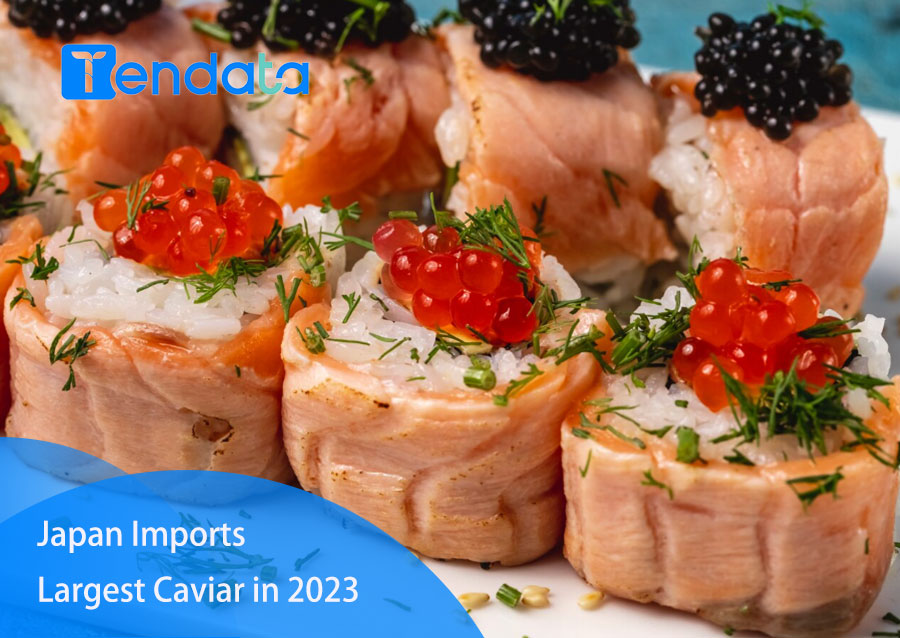 Import News
Import News
 16-01-2024
16-01-2024
In the realm of international trade, Japan stands out as a significant player in the importation of various goods, showcasing its diverse and discerning consumer market. Among the noteworthy imports, caviar has emerged as a particularly intriguing commodity, drawing attention for its growing popularity and substantial market share. This article delves into the dynamics of Japan's importation of caviar, exploring trends, preferences, and the broader landscape of the country's import industry.

The Allure of Japanese Markets for Caviar Imports
Japan's robust economy and cultural inclination toward opulence create an environment ripe for the importation of luxury goods, and caviar has emerged as a prime example. The allure of Japanese markets for caviar imports is multifaceted, blending cultural nuances, culinary sophistication, and a discerning consumer base.
1. Japan's Affinity for Exclusivity
Japanese culture places a premium on uniqueness and exclusivity, and this inclination extends to the culinary realm. Caviar, known for its rarity and association with luxury, perfectly aligns with the Japanese appreciation for one-of-a-kind experiences. The exclusivity of caviar elevates it beyond mere sustenance to a symbol of refined taste and sophistication, appealing to the Japanese penchant for acquiring items that reflect prestige and distinction.
2. Growing Culinary Sophistication
The evolution of Japan's culinary scene has been marked by an increasing openness to international flavors and a demand for premium ingredients. Caviar, with its versatile applications in haute cuisine, has found a welcome home in the kitchens of Japanese chefs and the dining tables of discerning consumers. As the Japanese palate becomes more sophisticated, there is a growing interest in exploring diverse and exotic flavors, positioning caviar as a key ingredient for culinary innovation.
3. Affluent Consumer Demographics
Japan's status as a major global economic powerhouse is reflected in the affluence of its consumer base. With a higher disposable income, Japanese consumers are more willing to indulge in luxury items, and caviar falls squarely into this category. The demographic landscape, characterized by a significant population with the means to appreciate and afford premium goods, contributes substantially to the allure of Japanese markets for caviar imports.
4. Cultural Appreciation for Fine Dining
Japanese culture places a strong emphasis on the art of dining, transforming meals into experiences that engage all the senses. The meticulous attention to detail in presentation, flavors, and overall aesthetic aligns seamlessly with the elegance and sophistication inherent in caviar. As the Japanese populace continues to appreciate and embrace fine dining, caviar becomes not just a food item but an integral part of an elevated culinary experience.
5. Integration into Traditional Ceremonies and Celebrations
Caviar has found its way into traditional Japanese ceremonies and celebratory occasions. Whether it's a high-profile business gathering, a wedding reception, or a celebration of success, the presence of caviar adds a touch of extravagance and grandeur. This integration into cultural practices further cements caviar's status as a desirable and symbolic delicacy in the Japanese market.
In essence, the allure of Japanese markets for caviar imports lies in the convergence of cultural values, culinary evolution, affluence, a passion for fine dining, and the integration of caviar into the fabric of traditional ceremonies. These factors collectively create a receptive and appreciative environment for caviar, making Japan a thriving hub for the importation of this luxurious delicacy.
Conclusion: The Seas of Caviar Imports in Japan
Japan's position as a significant importer of caviar underscores the country's penchant for luxury and exquisite tastes. Understanding the allure of the Japanese market, trade dynamics, emerging trends, challenges, and future projections provides a comprehensive perspective for stakeholders involved in the caviar import industry. As Japan continues to shape the global import landscape, caviar remains an intriguing and lucrative component of its diverse and discerning market.
How effective is Tendata Customs Data?
Shanghai Tendata is a leading global trade data provider, our data covers 218 countries and regions around the world. Among them, customs data is a very core part of Tendata's data system, which currently includes more than 80 countries around the world. Tendata first started by trade data, trade data in the customs data are from formal official channels, directly reflecting the real-time update of the relationship between the enterprises of various countries, the purchase and sale of goods, the price of the Tendata customs data information is comprehensive, true and accurate for the development of foreign customers is very valuable to use. Tendata's customs data information is comprehensive, true and accurate, which is very valuable for developing foreign customers.(>>> Click for More Details)
Of course, in addition to customs data, Tendata's business data and Internet data resources come from strategic cooperation with many well-known overseas commercial companies, and are also extremely valuable. In addition to the query function, it also helps importers and exporters to intelligently analyze the market, monitor customers and competitors, supervise and manage customers and trade dynamics. Import and export enterprises can make intelligent one-key inquiry by product, company name, HS code, SIC code and other information. It can also directly tap the key person contact information of target customers and directly get the phone number, email address and social account of the boss, purchasing and CEO. Importers and Exporters can take the initiative in a multi-method and multi-dimensional way to quickly establish contact with customers, dig deeper into customer needs and facilitate order cooperation.(>>> Click for More Details)

Category
Leave Message for Demo Request or Questions


 T-info
T-info T-discovery
T-discovery

 My
Tendata
My
Tendata Market Analysis
Market Analysis Customer
Development
Customer
Development Competitor
Monitoring
Competitor
Monitoring Customer Relationship
Customer Relationship





































































































































